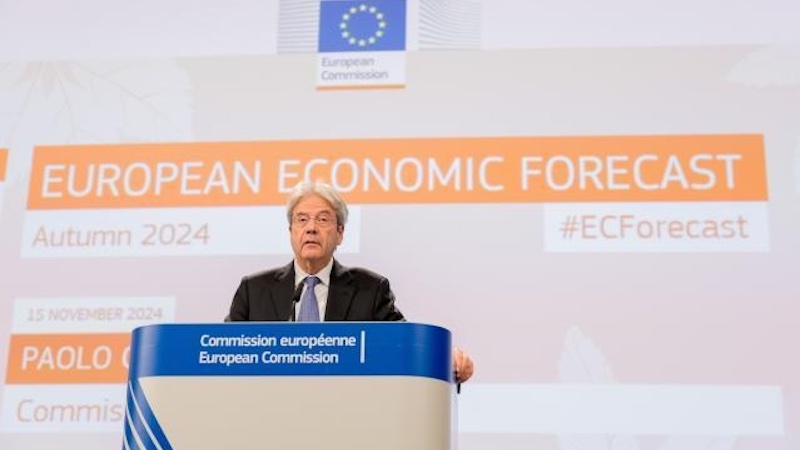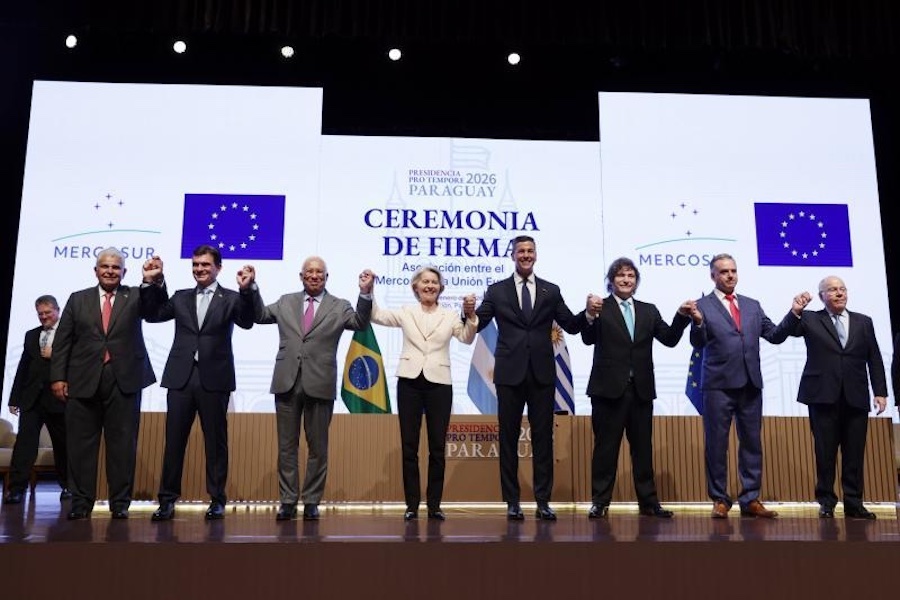#Europe
Autumn 2024 Economic Forecast: A gradual rebound in an adverse environment

Headline inflation in the euro area is set to more than halve in 2024, from 5.4% in 2023 to 2.4%, before easing more gradually to 2.1% in 2025 and 1.9% in 2026. In the EU, the disinflation process is projected to be even sharper in 2024, with headline inflation falling to 2.6%, from 6.4% in 2023, and to continue easing to 2.4% in 2025 and 2.0% in 2026.
Growth to accelerate as consumption picks up and investment rebounds
After resuming growth in the first quarter of 2024, the EU economy continued to expand throughout the second and third quarters at a steady, albeit subdued, pace.
Employment growth and recovery in real wages continued to support disposable incomes, but household consumption was restrained. A still high cost of living and increased uncertainty following the repeated exposure to extreme shocks, compounded with financial incentives to save in a context of high interest rates, led households to save an increasing share of their income. At the same time, investment disappointed, with a deep and broad-based contraction across most Member States and asset categories in the first half of 2024.
The restraint to consumption appears to be loosening. As the purchasing power of wages gradually recovers and interest rates decline, consumption is set to expand further. Investment is expected to rebound on the back of strong corporate balance sheets, recovering profits, and improving credit conditions. The impulse of the Recovery and Resilience Facility and other EU funds will also drive an increase in public investment over the forecast horizon.
Overall, domestic demand is projected to drive economic growth going forward. In 2025 and 2026, exports and imports are expected to grow at broadly the same pace, implying a neutral contribution to growth by net trade.
The disinflationary process continues
The disinflationary process that started towards end-2022 continues despite a slight pick-up in inflation in October, largely driven by energy prices.
Price pressures in services remain high, but are projected to moderate as from early 2025, driven by slowing wage growth and an expected pick-up in productivity, and supported by negative base effects. This sets the stage for inflation to fall towards target in late 2025 in the euro area and in 2026 in the EU.
Labour market remains strong, with record-low unemployment
The EU labour market held up well in the first half of 2024 and is expected to remain strong. Employment growth in the EU is set to continue, although at a slower pace, from 0.8% in 2024 (0.9% in the euro area) to 0.5% in 2026 (0.6% in the euro area).
In October, the EU unemployment rate reached a new historical low of 5.9%. In 2024 as a whole it is projected to stand at 6.1% (6.5% in the euro area) and to edge further down thereafter, reaching 5.9% in 2025 and 2026 (6.3% in the euro area).
Declining deficits on the back of fiscal consolidation
As many Member States work to lower their debt ratios, the EU general government deficit is set to decline in 2024 by around 0.4 pps., to 3.1% of GDP, and to 3.0% in 2025. In 2026, the positive economic momentum is projected to reduce the deficit further to 2.9%. In the euro area, the deficit is forecast to decrease from 3.0% in 2024 to 2.9% in 2025 and 2.8% in 2026.
The aggregate debt-to-GDP ratio of the EU is, however, projected to edge up, from 82.1% in 2023 to 83.4% in 2026. This follows an almost 10 pps. decrease between 2020 and 2023, and reflects the effect of still elevated primary deficits and rising interest expenditure, that are no longer offset by high nominal GDP growth as inflation eases. In the euro area, government debt is forecast to rise from 88.9% of GDP in 2023 to 90% in 2026.
Uncertainty and risks increase
Uncertainty and downside risks to the outlook have increased. Russia's protracted war of aggression against Ukraine and the intensified conflict in the Middle East fuel geopolitical risks and risks to energy security. A further increase in protectionist measures by trading partners could upend global trade, weighing on the EU's highly open economy.
On the domestic front, policy uncertainty and structural challenges in the manufacturing sector could entail further losses of competitiveness and weigh on growth and the labour market. Moreover, delays in the implementation of the RRF or a stronger than expected impact from fiscal consolidation could further dampen the resumption of growth. Finally, the recent floods in Spain illustrate the dramatic consequences that the increasing frequency and scope of natural hazards can have not only for the environment and the people affected, but also for the economy.
Background
This forecast is based on a set of technical assumptions concerning exchange rates, interest rates and commodity prices with a cut-off date of 31 October. For all other incoming data, including assumptions about government policies, this forecast takes into consideration information up until, and including, 25 October. Unless new policies are announced and specified in adequate detail, the projections assume no policy changes.
The European Commission publishes two comprehensive forecasts (spring and autumn) each year, covering a broad range of macroeconomic and fiscal variables for all EU Member States, candidate countries, EFTA countries and other major advanced and emerging market economies.
For More Information
Full document: Autumn 2024 Economic Forecast
https://economy-finance.ec.europa.eu/economic-forecast-and-surveys/economic-forecasts/autumn-2024-economic-forecast-gradual-rebound-adverse-environment_en














